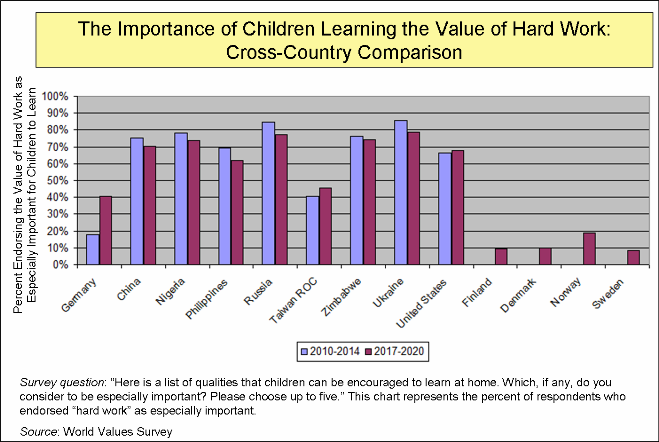The inspiration for this post came from reading about a poster on “white culture” that was part of a Smithsonian Museum exhibit on race. Here’s an excerpt, plus relevant bits of the poster:
“The Smithsonian National Museum of African American History and Culture recently unveiled guidelines for talking about race. A graphic displayed in the guidelines, entitled "Aspects and Assumptions of Whiteness in the United States," declares that rational thinking and hard work, among others, are white values.” In Smithsonian Race Guidelines, Rational Thinking and Hard Work Are White Values by Marina Watts/Newsweek July17, 2020
My first reaction to reading this stuff was “How do they know? Did they take surveys of white people?”. Which got me thinking…well, what do the surveys say? So I checked them out, focusing on the value of hard work. First stop: Pew Research, known for high-quality surveys and an interest in race/ethnic relations. As it turns out, Pew did do a 2014 survey on what people thought were important values to teach children. Per this survey, 42% of both whites and blacks said that teaching children the value of hard work is “especially important” and 90-91% said it’s important to some extent.
What about the value of hard work in other countries? I would assume that “white values” would be especially strong in countries where residents of European ancestry are the largest ethnic group. And if the work ethic is specifically a white thing, this would be reflected in cross-country surveys. So let’s take a look:
Mmmm. What’s up with Germany and the Nordic countries? These historically protestant countries seem to have lost their enthusiasm for hard work - as opposed to China, the Philippines, Nigeria, Zimbabwe, Russia and Ukraine. Let’s dig deeper…
Interesting. These surveys show a link between subjective values and real-world conditions. To wit: people living in high-tax countries work fewer hours and value work less than those living in countries that tax less. I assume the high-tax countries spend much of their tax revenue on maintaining a solid safety net and that people living in these countries are less afraid of falling into abject poverty than in countries lacking such protection. Perhaps a strong work ethic develops in response to this fear (among other things).
This is not to say that people living in countries with strong protections lose their work ethic. Most still value hard work, just not as intensely as in places where there’s no one to catch them if they fall. Case in point:
So is hard work a “white” value? Yes, and it’s an important value for just about everyone else as well.



